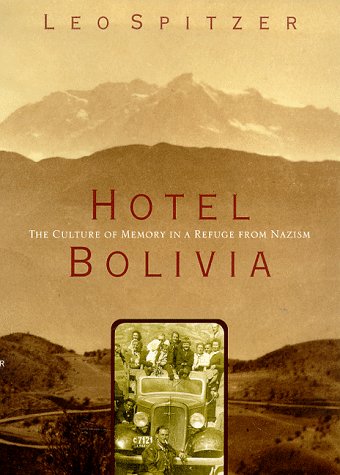Hill & Wang Pub
Hotel Bolivia: The Culture of Memory in a Refuge from Nazism
Regular price
$9.95 USD
Regular price
Sale price
$9.95 USD
Unit price
per
Shipping calculated at checkout.
Couldn't load pickup availability
Title: Hotel Bolivia: The Culture of Memory in a Refuge from Nazism
Author: Leo Spitzer
ISBN: 9780809055456
Publisher: Hill & Wang Pub
Published: 1998
Binding: Hardcover
Language: English
Condition: Used: Near Fine
Excellent, unmarked copy with little wear and tight binding. We ship in recyclable American-made mailers. 100% money-back guarantee on all orders.
A 1673012
Publisher Description:
In the 1930s, many tens of thousands of people fleeing Nazi-dominated Europe found refuge in Latin America. And in the short, terrifying months between the Anschluss and Kristallnacht in 1938 and the outbreak of World War II, Bolivia was one of the few remaining places in the entire world to accept Jewish refugees; more than twenty thousand Central Europeans were soon remaking their lives in this unknown land. With a subtle use of oral-history sources - interviews with survivors who left Bolivia and now live in Israel, the United States, Europe, and elsewhere - and unusual archival illustrations and photographs, he examines the effects of displacement on the experiences of people remaking their lives.
Author: Leo Spitzer
ISBN: 9780809055456
Publisher: Hill & Wang Pub
Published: 1998
Binding: Hardcover
Language: English
Condition: Used: Near Fine
Excellent, unmarked copy with little wear and tight binding. We ship in recyclable American-made mailers. 100% money-back guarantee on all orders.
A 1673012
Publisher Description:
In the 1930s, many tens of thousands of people fleeing Nazi-dominated Europe found refuge in Latin America. And in the short, terrifying months between the Anschluss and Kristallnacht in 1938 and the outbreak of World War II, Bolivia was one of the few remaining places in the entire world to accept Jewish refugees; more than twenty thousand Central Europeans were soon remaking their lives in this unknown land. With a subtle use of oral-history sources - interviews with survivors who left Bolivia and now live in Israel, the United States, Europe, and elsewhere - and unusual archival illustrations and photographs, he examines the effects of displacement on the experiences of people remaking their lives.

